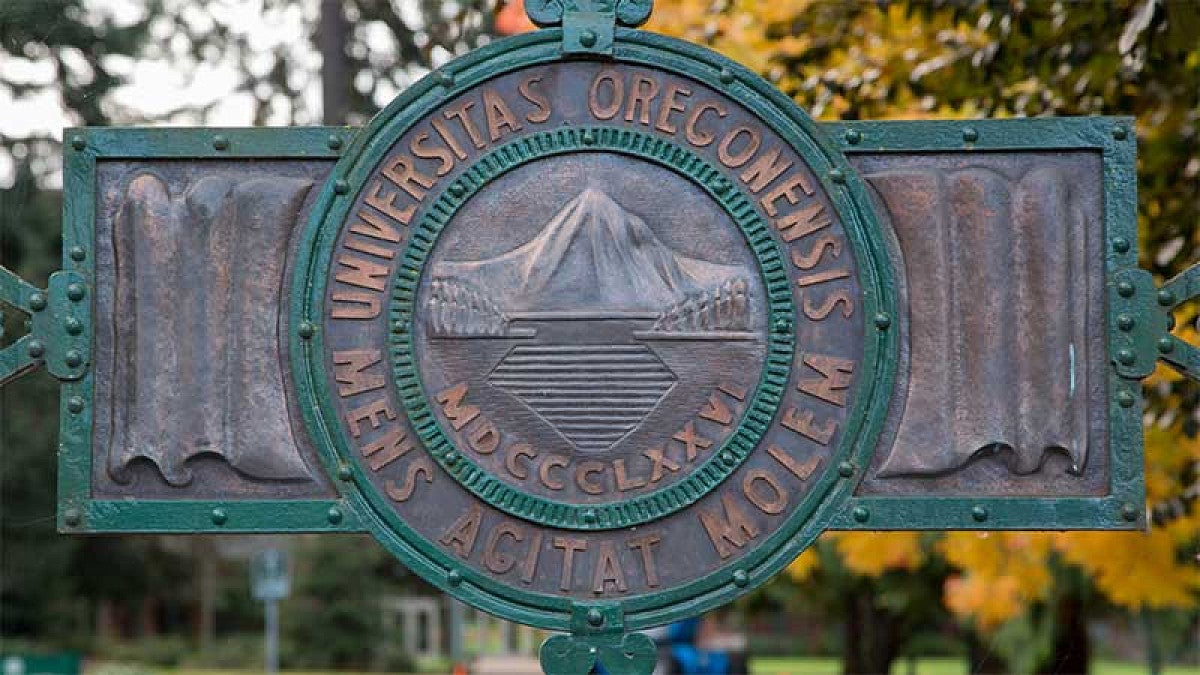The University of Oregon Board of Trustees have named a new residence hall for the Yasui family, a Japanese American family whose members attended the UO and suffered discrimination in the World War II era.
Three generations of the Yasuis attended the UO, and family members wanted the naming to honor the activism and service of four siblings — Minoru, Michi, Shu and Yuka — on behalf of their relatives and the entire Japanese American community “in the interest of democracy and justice.”
The board approved the naming of Yasui Hall on Tuesday during its quarterly meeting in the Ford Alumni Center. The hall is one of two new residence halls that opened last fall at the corner of Agate and 15th streets and carried the placeholder name of Building C. The adjacent Building B, which also opened in the fall, is still in the naming process.
The eldest sibling, Minoru “Min” Yasui, was the first Japanese American to graduate from UO School of Law, which he did with honors in 1939, and was the first Japanese American admitted to the Oregon Bar.
After President Franklin D. Roosevelt signed Executive Order 9066, which imposed curfews for Japanese Americans in the West and ultimately forced 125,000 people into incarceration camps, Yasui went out after curfew in Portland to provoke arrest so he could file a legal challenge to the order.
He was arrested and convicted of violating curfew and was ultimately sentenced to a year in prison in solitary confinement and stripped of his citizenship, which barred him from practicing law. The U.S. Supreme Court upheld his conviction and Executive Order 9066, saying it was justified by “military necessity.” After serving nine months in prison, he was moved to an incarceration camp with his family.
After the war, he practiced law in Colorado while continuing his political activism, devoting his life to public service and civil rights and to redressing the injustices inflicted upon Japanese Americans during the war.
In 1984, his long-standing conviction was vacated and the underlying indictment dismissed by the federal district court in Oregon.
The law school established an endowed chair in his name in 2002, the first of its kind to be named for a Japanese American. In 2015, President Barack Obama awarded Yasui a posthumous Presidential Medal of Freedom.
The board also heard from President Karl Scholz, who reviewed the four goals of a new strategic plan as developed during a months-long listening project called UO Onward.
- Student success, including removing barriers to on-time graduation.
- Career preparation, including better alignment between the needs of industry and efforts to ensure students graduate from the UO ready to contribute and succeed.
- Creating a community of flourishing for faculty, staff, students and others, emphasizing well-being and opportunities for growth and resilience.
- Scholarship and creative work that accelerates societal impact, elevates the human experience and develops innovative models for a changing world, particularly in the areas of environmental resilience, mental health and well-being, sport and human performance, and applied sciences, building on UO strengths in biological and material sciences.
Scholz said he plans to present the strategic plan at the September meeting of the board.
Scholz also said the university was in the midst of a challenging period and warned students against disrupting graduation ceremonies. The UO cherishes free speech, but does not condone disruptive behavior, he said. Free speech is necessary to foster an environment where diverse views can flourish, he said, but disruptive behavior, such as blocking access to buildings, defacing property and preventing others from speaking violates student conduct rules. Students who disrupt graduation or other events could face disciplinary action, he said.
Finally, the board heard a presentation from Bob Guldberg, vice president and executive director of the Knight Campus for Accelerating Scientific Impact, Chris Poulsen, dean of the College of Arts and Sciences, and Anshum “AR” Razdan, vice president for research and innovation, on workforce development in the semiconductor industry in Oregon.
The Knight Campus Graduate Internship Program got its start 25 years ago when the semiconductor industry approached the UO to ask for help in developing skilled workers for their plants. The program produces about 50 students each year prepared to enter the workforce.
That pipeline needs to expand to meet the demand for skilled workers, Guldberg said.
CAS provides its students with state-of-the-art analytical tools and provides them with a broad liberal arts education fostering a breadth and depth of technical skills, communication and human schools, and the ability to collaborate and adapt, which provides them with a competitive edge, Poulsen said.
The college will be launching a new materials science and technology degree in 2025 for up to 100 undergraduates each year, providing a skilled pool of graduates for the semiconductor industry and a strong pipeline for master’s and doctoral programs.
Intel is Oregon’s largest employer with some 22,000 workers and is planning to invest $36 billion to expand its Oregon operations, adding several thousand new jobs, Razdan said. Currently more than 400 Oregon graduates work at Intel, he said.
In other business, the board:
- Approved an operating expenditure budget of $1.45 billion and a capital expenditure budget of $297.5 billion for fiscal year 2025 budget.
- Approved a resolution making technical adjustments to the tuition and fee table for the 2024-25 academic year. The amendments approved by the board fixed technical errors and improved billing clarity.


